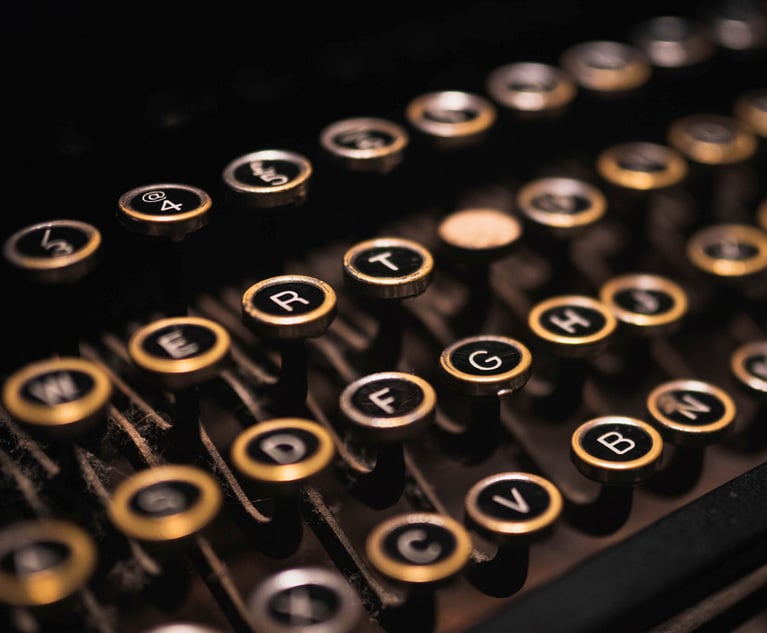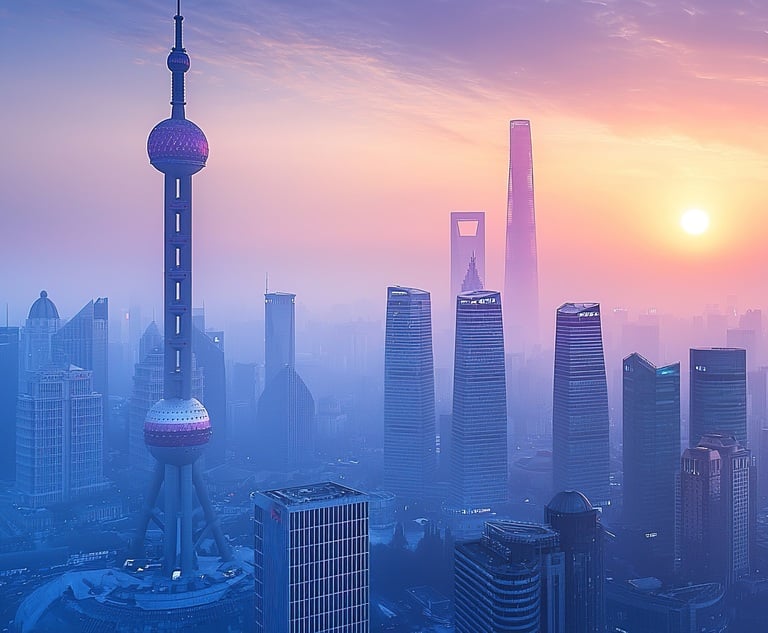Reflections of a Refugee Lawyer on International Women's Day
An attorney who works with refugees asks, "Can we talk about equal rights for women—all women—when refugee women are excluded from this dialogue?"
March 08, 2019 at 12:13 PM
8 minute read
 Photo: Shutterstock.com
Photo: Shutterstock.com
The woman had travelled that morning from a distant town where she lived, and she had not told anyone she was coming. She had heard there was an American lawyer who helped women refugees. The one who told her this warned her: "Be careful because if your brother finds out you went to see her, he might kill you." She arrived in the afternoon. With her timid step she followed me into a private office, lifted the black niqab that covered her face, and before I could speak she said:
"I heard you help women in danger. I've come to ask you to help me go to America."
I answered, as is my habit, that I have no power to help anyone go to America, but I would see if I could help her in another way. My original intention was to gain a basic understanding of her situation and begin to build trust with her, which was necessary before going deeper into her story. But going slowly was impossible because once she began talking she was unstoppable. I did not redirect her because after the first attempt I understood she was desperate for someone to listen to her.
Stage by stage, one violent experience after another, she poured out her history: the extreme poverty, the child abuse, being forced to leave school, being forced to marry a man she didn't know, the domestic violence, childbirth, the war, being violated by soldiers; and then, abandonment by her husband, because of the violence, her shame and despair as "a stained woman", and being forced to live with her mother and brother who now said they wished she was dead.
Although two years have passed since that day, I still remember what she said next:
"A while ago I decided to take my life. I waited for my mother to go to the mosque. I opened the gas bottles. I was waiting to suffocate. Then I got scared because it was forbidden and I closed the bottles. I felt this way because there is no life for me or for my children. I want to go somewhere where no one can find us."
Only then did she burst into tears. That single statement, which summarised an entire life of violence, was enough for me to want to help her any way I could. She sat straight in her chair, holding her handbag in her lap with both hands. Looking into my eyes she said: "I don't want my children to live the way that I have lived. Since I was a child I have suffered."
Just at that moment, the evening call to prayer began over the public loudspeakers. She gave a start and rose to her feet: "I have to go now." That was the only thing she said, and then she lowered her niqab so that only her desperate eyes were showing through a small slit. Shrouded in black from head to toe, she was reduced to a simple faceless outline of pain.
I wish I could say I had a plan for her safety that day. I wish I could say America would offer her and her children protection from violence. That would have made it much simpler. But I was doubtful this would happen. The United States had slashed its refugee admissions numbers, and at the time I met her there was a travel ban in place to prevent Muslims from entering the country. As for other countries, less than one percent of refugees are ever resettled. Although Canada and some European countries have programmes for women at risk, those programmes are limited and there are many more vulnerable women than spaces for them.
Millions of women across the globe are forced to flee violence. Millions endure hard journeys – journeys that, for most, end in more suffering. In host countries, refugees throw themselves on the mercies of humanitarian organisations and seek protection from the UN High Commissioner for Refugees (UNHCR). After nearly 20 years of representing refugees, I have seen thousands of wasted lives. I have recorded thousands of unlived dreams. It isn't easy work. If you believe in a common humanity, this loss of human potential weighs on your conscience.
That was the reason I flew back and forth to the Middle East every month – to try and support refugees with dreams. Each time I was in the field I saw the woman in the veil, and each time, it was harder for me to convince her to sustain hope. Her relatives kept her imprisoned in the house and she had to sneak away to see me. Although UNHCR had recognised her as a refugee, no country had accepted her case.
The last time I saw her, she said: "I cry every night. When I am awake crying, I think of my children. I think about how their future is going to be. I don't have a future. I stopped believing that I will leave and study and have a life. I just want God to change my life for my children. Time is passing. The years are passing."
Of course, there is no right to refugee resettlement, and there is no guarantee it will ever happen for her. The entire sustainability of the programme depends upon countries agreeing to accept refugees. But most don't. How is it possible, then, to advocate for refugee women in a world that doesn't provide space for them? This is the question I was asking myself leading up to International Women's Day. I believe in the sentiment behind the day, but am struggling with its implementation in our work.
I decided to interview a group of women refugees from Sudan, Yemen and Iraq to learn their perspective. None of them had ever heard of the day. Almost at once they offered opinions on how it had no meaning in their lives. An elder woman named Fatima said: "An international day that celebrates women? Maybe there is that day in Yemen, but nobody cares about it." And her daughter said: "In my country, women can't speak. We are not allowed to learn. We are not allowed anything. We exist to produce sons."
A woman named Safia said: "In Sudan, being born a girl condemns you to a half-life." She was the most outspoken in the group, tall and slender, her brilliant floral chador contrasting with her crimson abaya. She had been forced to leave school as a child and then suffered multiple incidents of violence. For a woman in her country, sexual violence was more than a physical assault. It was perceived as a stain on her honour, and it destroyed her life. So she fled. But disaster was added to disaster in her life as a refugee woman – homelessness, poverty and sexual exploitation. The scars were all there, but her courage remained. I admired her so much for that courage.
I asked the woman from Iraq for her perspective. She said: "As women refugees, we have a double curse. We cannot create our own life because we are women, and we cannot create our own life because we are refugees. We are living, but we are not alive." Safia and Fatima nodded in agreement. I would have liked to hear more on the subject, but I was worried that inviting a discussion about women's rights would put our project at risk. My goal wasn't to promote feminist ideas in the Arab world; it was to protect the most vulnerable women refugees. So I didn't press.
But all that night I kept thinking: "Where are women's rights in the refugee context? Who is fighting for these women? Can we claim 'balance is better' when there is such a grave imbalance in the distribution of rights among women across the globe? Can we talk about equal rights for women – all women – when refugee women are excluded from this dialogue?"
These were the questions that occurred to me after my interview with the women. And I thought, when I went back to my hotel, perhaps there was an unintended omission in our celebration of International Women's Day. I wondered if women around the world would be willing to unite to address this omission. I wondered if women around the world would be willing to stand together for the woman in the veil.
Jayne E Fleming is pro bono counsel to the international law firm Reed Smith. She heads the firm's human rights team and leads refugee protection projects in the Middle East and Greece. She is the founder of the Patricia Fleming Foundation, a humanitarian NGO that provides shelter and support to refugees around the world.
This content has been archived. It is available through our partners, LexisNexis® and Bloomberg Law.
To view this content, please continue to their sites.
Not a Lexis Subscriber?
Subscribe Now
Not a Bloomberg Law Subscriber?
Subscribe Now
NOT FOR REPRINT
© 2025 ALM Global, LLC, All Rights Reserved. Request academic re-use from www.copyright.com. All other uses, submit a request to [email protected]. For more information visit Asset & Logo Licensing.
You Might Like
View All
The Quiet Revolution: Private Equity’s Calculated Push Into Law Firms
5 minute read

Trending Stories
- 1SDNY US Attorney Damian Williams Lands at Paul Weiss
- 2Litigators of the Week: A Knockout Blow to Latest FCC Net Neutrality Rules After ‘Loper Bright’
- 3Litigator of the Week Runners-Up and Shout-Outs
- 4Norton Rose Sues South Africa Government Over Ethnicity Score System
- 5KMPG Wants to Provide Legal Services in the US. Now All Eyes Are on Their Big Four Peers
Who Got The Work
Michael G. Bongiorno, Andrew Scott Dulberg and Elizabeth E. Driscoll from Wilmer Cutler Pickering Hale and Dorr have stepped in to represent Symbotic Inc., an A.I.-enabled technology platform that focuses on increasing supply chain efficiency, and other defendants in a pending shareholder derivative lawsuit. The case, filed Oct. 2 in Massachusetts District Court by the Brown Law Firm on behalf of Stephen Austen, accuses certain officers and directors of misleading investors in regard to Symbotic's potential for margin growth by failing to disclose that the company was not equipped to timely deploy its systems or manage expenses through project delays. The case, assigned to U.S. District Judge Nathaniel M. Gorton, is 1:24-cv-12522, Austen v. Cohen et al.
Who Got The Work
Edmund Polubinski and Marie Killmond of Davis Polk & Wardwell have entered appearances for data platform software development company MongoDB and other defendants in a pending shareholder derivative lawsuit. The action, filed Oct. 7 in New York Southern District Court by the Brown Law Firm, accuses the company's directors and/or officers of falsely expressing confidence in the company’s restructuring of its sales incentive plan and downplaying the severity of decreases in its upfront commitments. The case is 1:24-cv-07594, Roy v. Ittycheria et al.
Who Got The Work
Amy O. Bruchs and Kurt F. Ellison of Michael Best & Friedrich have entered appearances for Epic Systems Corp. in a pending employment discrimination lawsuit. The suit was filed Sept. 7 in Wisconsin Western District Court by Levine Eisberner LLC and Siri & Glimstad on behalf of a project manager who claims that he was wrongfully terminated after applying for a religious exemption to the defendant's COVID-19 vaccine mandate. The case, assigned to U.S. Magistrate Judge Anita Marie Boor, is 3:24-cv-00630, Secker, Nathan v. Epic Systems Corporation.
Who Got The Work
David X. Sullivan, Thomas J. Finn and Gregory A. Hall from McCarter & English have entered appearances for Sunrun Installation Services in a pending civil rights lawsuit. The complaint was filed Sept. 4 in Connecticut District Court by attorney Robert M. Berke on behalf of former employee George Edward Steins, who was arrested and charged with employing an unregistered home improvement salesperson. The complaint alleges that had Sunrun informed the Connecticut Department of Consumer Protection that the plaintiff's employment had ended in 2017 and that he no longer held Sunrun's home improvement contractor license, he would not have been hit with charges, which were dismissed in May 2024. The case, assigned to U.S. District Judge Jeffrey A. Meyer, is 3:24-cv-01423, Steins v. Sunrun, Inc. et al.
Who Got The Work
Greenberg Traurig shareholder Joshua L. Raskin has entered an appearance for boohoo.com UK Ltd. in a pending patent infringement lawsuit. The suit, filed Sept. 3 in Texas Eastern District Court by Rozier Hardt McDonough on behalf of Alto Dynamics, asserts five patents related to an online shopping platform. The case, assigned to U.S. District Judge Rodney Gilstrap, is 2:24-cv-00719, Alto Dynamics, LLC v. boohoo.com UK Limited.
Featured Firms
Law Offices of Gary Martin Hays & Associates, P.C.
(470) 294-1674
Law Offices of Mark E. Salomone
(857) 444-6468
Smith & Hassler
(713) 739-1250









